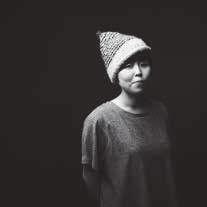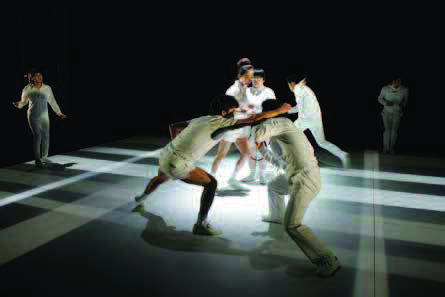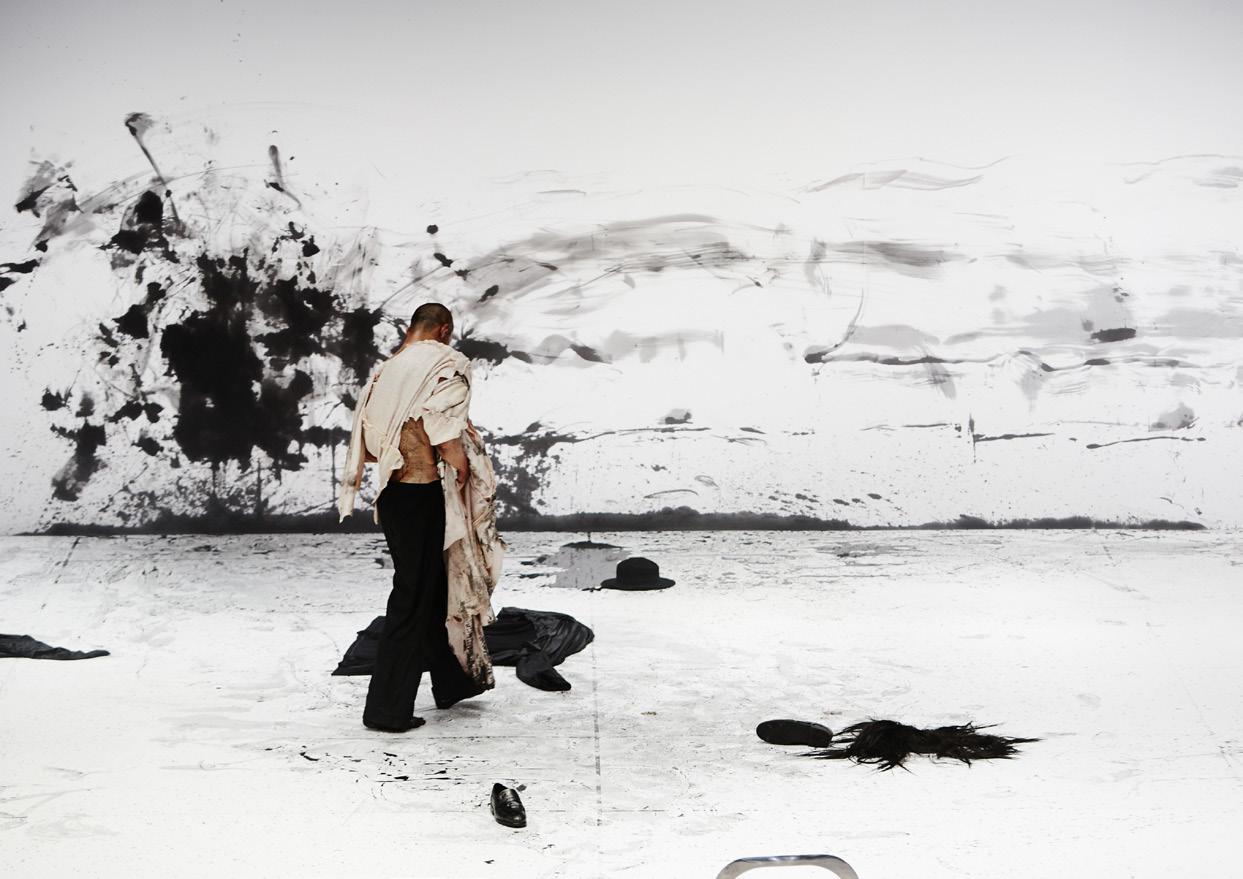Performance Info
KHOO Ja Hye (Playwright as well as theatre director. Director of the company ’theater, definitely’)
: “Are you righteous?" A question, an unlimited form
You majored in Korean language and literature. Have you dreamed of becoming a writer since you were young? What made you choose theatre and become a theatre director?
I’ve always enjoyed reading and writing since I was young, but I thought of ’theatre’ first. In high school, I had a chance to see a creative play and it made me think of becoming an actress. When I was little, I was so introverted that I had a kind of speech problem. So probably I thought that I could be a different person on stage as an actress. Then I joined a theatre club in college and took part in its activities as an actress as well as director. Then, I had opportunities to get training as an actress and director at a few public and private theatre educational institutions.
I had to stop the training because of an incident and concentrated on writing a play. The piece I wrote at that time was invited to the new plays festival by Korea National University of Arts. Meanwhile, after passing the open recruitment process, I became an intern at the directing department of the National Theatre Company of Korea and worked with prominent directors including SOHN Jin Chaek, KIM Gwang Bo and KANG Ryang Won as assistant director. While working on high-quality plays with excellent performers in good environments suitable for the ’national’ company, I asked myself a question about so-called well-made theatre. Finally in 2012, I decided to do my own work and started to do so by writing a script of and directing Theater, Definitely on what theatre is.
You have presented a wide spectrum of works from script-based theatre to collaborative creation, drama theatre to non-narrative theatre. How do you choose the theme and the form of your work?
There are topics and stories that cannot be turned into a drama. In theatre, non-dramas are also necessary and I wanted to create and direct that kind of work. The forms and styles of the work will come afterwards. I choose appropriate forms and ways of creation depending on the topics and stories I want to tell.
For example, I have worked on the Sewol ferry series with the company for three years. In Today’s April 16th, 2015.8 (2015) presented in the first year, dialogues evoking the Sewol ferry disaster, drawn from the existing plays, are reconstructed. In the second year, Killing Time (2016), a collaborative production based on the reconstruction of the words of the perpetrators. In its third series in 2017, I wrote and directed A Sense of Ethics (2017), a drama whose protagonist is the perpetrator, the person taking the ultimate responsibility, pursued by the hunter.
As a playwright, I also worked on Once Play (2014) about the mourning for the writings that died out. The plays, scenes and characters that had never been introduced turned into a new work. In the case of non-narrative works, I choose a concept and then create it by myself or do it together with performers.
Then, what are the things in common in the subjects and material of your work deciding the form of your work, in other words, those applied commonly to your works of diverse forms?
I resist something parasitic on the existing dominant structure or that internalizing this structure. So to speak, I focus on human weakness: humans pretend to oppose and resist the structure itself, but accept it and rationalize their behavior in fact. However, it is different from the despair that all humans are the same, acting that way. What I want is a punishment for contradictory behavior and philosophy or the act of concealing the desire by disclosing it onstage.
More specifically, I’ve paid attention to the issues of class, generation and gender that have been strongly structured. I’d like to point out how so-called progressive people internalize the solid structure of class, generation and gender and the fact that they are placed in the position the perpetrator. This Dystopia (2015) shows a contrast between the previous generation in pursuit of targetless resistance and revolution like tennis without a ball and the failed generation born in the destructed world. A Study of Perpetrators: With an Appendix for How to Write an Apology (2017) reveals the reality of sexual crime committed by elite artists, reenacted in language.
To be honest, I have to confess that the above-mentioned dilemma also applies to me as I want to belong to the mainstream, while recognizing the unreasonable gap between the mainstream and non-mainstream.
What kind of work makes you feel satisfied? Which work do you think represents you best?
The works that I studied and created with the members of the theatre troupe who understand and accept my varied works give me a sense of achievement the most. The pieces Killing Time and Elephant (original work by Minoru Betsuyaku, 2016) seem to show the characteristics of the troupe more than mine compared to the previous works.
I think my signature work is Commercial, Definitely: Macadamia, Plagiarism, Mers and Mansplain (2016). Its premiere was presented under the title of Commercial, Definitely, at No. 1, Hyewha-dong 6th Dongin Festival held with a theme of ’commercial production’ in 2015. It was an attempt to bring up a question of the idea that ’Young theatre with an emphasis on experiment and provocation is well-received.’ as well as the fact that this piece was defined as a ’commercial production.’ In fact, this piece was performed in a number of public production theatres. It presented the episodes disclosing how the dominant power was operating in Korea at that time, demonstrating the custom of creating plays and the structure of consuming the workers. While staging it at the little theatre, I expected it to be invited to Schaubühne in Germany. When it was represented at the public production theatre, it was finally sold to Ostermeier.
The name ’theater, definitely’ seems to reflect an absolute faith in theatre. What kind of plays are you planning to create from now on?
I like to work on theatre because it helps me broaden my views and thoughts. The most interesting part of it is the process of discovering the ’concept’ of each work with those who I work with. Recently, I’m interested in meeting the community and this era as well as extending my work, while encompassing a wider range of fields. My goal is to find out the concept of time and space and bring it to the theatre, instead of calling it theatre and being trapped in the conventions of theatre.
* Photo "Commercial, Definitely: Macadamia, Plagiarism, Mers and Mansplain" Copyright : Namsan Arts Center
Production Details
- Director
KHOO Ja Hye
Reference
- E-mailredneckpast@empas.com









.jpg)


 PREV
PREV
.jpeg)
.jpg)
_(c)포스(FORCE).jpg)
_(c)장석현_코끼리들이 웃는다(SUKHYUN JANG_ELEPHANTS LAUGH).jpg)
.jpg)
.jpg)
_(c)한받(Hahn Vad).jpg)
_(c)비주얼씨어터 꽃(CCOT)(1).jpg)
_(c)봉앤줄 (BONGnJOULE)(1).jpg)
_(c)대한민국연극제 2019 (Korea Theater Festival 2019)(0).jpg)
_(c)몸꼴(Momggol)(1).jpg)
.png)
2018MODAFE_Taemin Cho (2).jpg)











